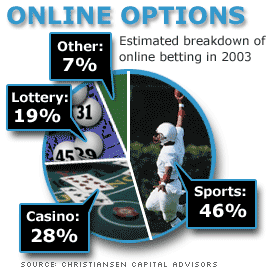
NEW YORK (CNN/Money) - It seems strange to say this, but placing an online bet shouldn't be a gamble.
But futile U.S. efforts to prohibit wagering on the Internet are making it so -- even as they do relatively little to stem the amounts being bet online.
Most online gambling operations are legitimate. But by forcing online betting off shore, the federal government has left millions of Americans with few protections from unscrupulous operators. And some foreign sites have been unwilling to pay up when big bets go against them.
That's the lesson learned the hard way by group of upstate New York horse owners and players.
Back in April, they decided to put a big bet on their horse, He's Vivid. The group wagered a total of $23,725 on their horse through straight, exacta and daily double bets in the race at Finger Lakes Race Track near Rochester, N.Y.
Since Fingers Lakes is a small track, the bettors knew putting so much money into play there would shift the odds to near-even money, rather than long-shot odds they could expect.
So they went to a series of 22 offshore gambling operations, many which advertise in U.S. horse racing newspapers. When the horse came in, only eight paid in full immediately, while another two eventually paid in full.
The rest have paid only some or none of the winnings, and the gamblers estimate only about a third of $300,000 in all has been paid.
 |
|
| He's Vivid won his first race in April, but his owners who bet on him online finished out of their money. |
Some sites challenged the results of the race, which was cleared by track officials after an investigation. Other sites claimed that the gamblers had violated rules, or needed to wager even more in order to collect their winnings.
"When we made the wager, we felt we were doing business with reputable companies, even though we realized they weren't covered by U.S. laws," said Joe Marcoccia, one of the group. "We felt quite safe."
Push for legalization
Critics of online gaming would likely say the bettors' problems are an argument for continued prohibition. But executives in the online gambling industry argue that Marcoccia's experience illustrates the need for legalization and proper oversight.

"In 1994, I said, 'Internet gambling is no good and we have to stop it,'" said Frank Catania, the former director of the New Jersey Division of Gaming Enforcement. "But when I had attorneys look into it, I came to the opinion that Internet gambling is not going to be stopped."
Catania, who now works as a consultant to the industry, believes that legalizing online sports wagering and gambling should be handled at the state level.

Others would prefer to see federal legislation. Another avenue might be through the World Trade Organization, which regulates trade between nations.
The tiny Caribbean nation of Antigua and Barbuda won a preliminary round in the WTO against the United States this spring. If ongoing dispute-resolution talks fail, the WTO could impose trade sanctions on the United States.
Some doubt that Antigua and Barbuda has the clout to force a change of U.S. law, even with the WTO behind it. But a win by that nation could open the way for other, bigger nations, including the United Kingdom, to push for changes.
In the end, it may be the business case for online gambling that leads to legalization here.
| SportsBiz
|

|
| Click here for SI.com sports coverage
|
|
|
|
"It seems bizarre to me that the United States would sit on its hands and let the United Kingdom get a competitive advantage," said David Carruthers, CEO of BetonSports, an online sports book with operations in England and Costa Rica that gets the majority of its business from U.S. gamblers.
"This could be the home of online gambling for the world," he said during his trip to New York this week, where he met with other industry officials interested in legalization.
But opposition to online gambling is a safer position for most politicians to hold, and prohibition has wide support in Congress.
The professional sports leagues and the NCAA would fight hard any legalization of online sports wagering. Many governors worry about a drop in lottery and casino revenue.
So despite the business and public policy arguments in favor of it, I think legalization of online gambling is a long shot.
And that means that online wagering is going to remain even more of a gamble than it should be.

|

